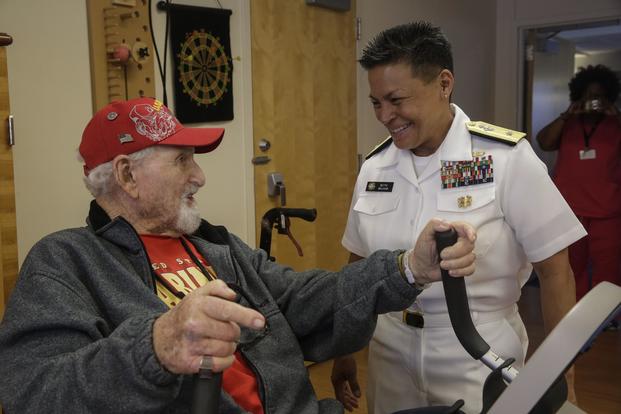Although the number of veterans in nursing homes is expected to rise 16% between 2017 and 2022 as veterans who served in Vietnam continue to age, the VA may not be prepared to handle the increase, according to a new report from the Government Accountability Office.
The report, released Aug. 2, found the number of veterans in VA-funded nursing home care is expected to total about 44,000 by 2022. But challenges in contracting with community nursing homes (CNHs), which provide the bulk of that care, could keep the agency from being able to meet demands. And while some of those issues may be helped by a recent VA health care law, known as the Mission Act, concerns remain, auditors wrote.
"While VA expects to continue placing more of the veterans needing nursing home care into CNHs, officials noted some challenges contracting with these homes," the GAO report states. "Specifically, VA central office officials said that about 600 CNHs had decided to end their contracts with VA over the last few years for a variety of reasons. For example, officials from four of the [VA Medical Centers] we interviewed told us about CNH concerns that contract approvals can take two years, homes have difficulties meeting VA staff requirements, and VA's payment rates were very low."
In addition, the homes may not be able to handle the special needs some elderly veterans face, including behavioral issues or dementia, the study found.
"[VA officials] said homes may not have any of the necessary specialized equipment or trained staff, or may not have as many of these beds as needed, to meet certain veterans' special care needs," the report said. "VA officials told us that they are working to expand the availability of special needs care in each of the three setting."
The VA covers the full or partial cost of nursing home care for veterans, depending on availability and the veteran's disability rating or injuries. Veterans rated at 70 percent or higher for service-connected disabilities or those who are receiving nursing home care as the result of a service-connected disability are fully covered.
The system provides care in three types of homes. CNHs are publicly or privately owned and operated and contracted with the VA. State veterans homes are typically owned and operated under the preview of the state in which they are located. And community living centers, which often provide acute care, are owned and operated by the VA and associated with the local VA hospital.
Auditors found the VA should do a better job monitoring the quality and performance of nursing homes, an improvement that will be increasingly important as the number of veterans using the facilities increases.
VA officials contract out inspections of nursing homes, but do not regularly monitor contractors' performance to determine whether or not inspections are being done correctly, the report said. And the way the system works with state veteran homes does not flag all quality problems, which keeps the system from tracking them.
Moreover, VA officials haven't given VA hospital staff instructions on how to conduct on-site reviews of nursing homes without the contractor, which means they can't hold those facilities accountable for correcting problems, the report said.
"By making enhancements to its oversight of inspections across all three settings, VA would have greater assurance that the inspections are effective in ensuring the quality of care within each setting," the report said.
The report also recommended that VA clarify its communication on the types of nursing home care are available, giving more information on state veterans homes and how their quality compares to the other options.
VA officials generally concurred with all four recommendations. They said they plan to act on the report's recommendation to increase oversight of inspectors while changing how issues with state veteran homes are flagged. They argued, however, that their employees don't have the authority or oversight to inspect community nursing homes directly. They also said they would investigate whether or not it's feasible to provide data on state veteran home quality.
-- Amy Bushatz can be reached at amy.bushtaz@military.com.












